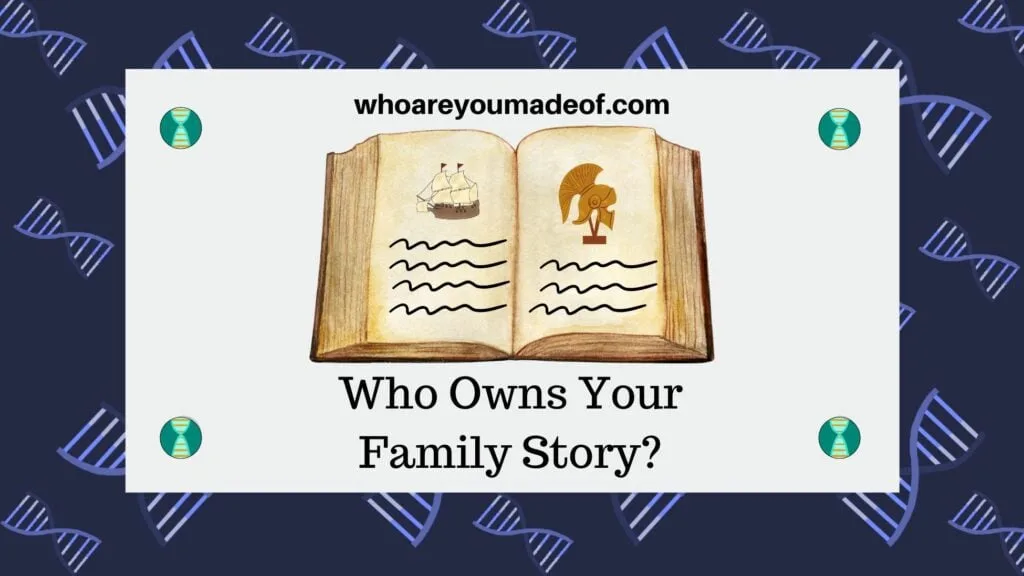Have you ever wondered who owns your family story, and which boundaries, if any, should limit your family tree research? In this post, find a discussion about who has the right to tangible and intangible aspects of a family's history.

Most people who have dabbled in genealogy know that not everyone in their family loves the fact that they have decided to go digging around in the past. After all, all families have secrets and many people believe that the past should be left alone.
At what point should we stop researching into the lives of an ancestor or relative who lived long ago?
For the more creative, ambitious family history researchers among us, do we have the right to publish what we have learned about our family?
There is also a debate that comes up frequently on social media about old photographs found on family history sites. If the photograph is of your ancestor, who owns it?
And finally, do we have the right to learn as much as we want about someone who is no longer with us? In other words, do our ancestors have a right to privacy?
Who owns family stories?
As a general rule, we all "own" our individual histories, and have a right to explore the history of our ancestors that is equal the right of anyone else in our family to do the same.
I am a great believer in the idea that everyone has an almost absolute right to explore all aspects of their family history. Understanding where we come from is key to forming a sense of identity and can help shape our futures.
However, when we set out on our journey to study our family history, we don't often realize that we will also uncover the history of both our close and distant relatives. Through our research, we might even learn sensitive information about living people in our family tree.
We will almost immediately find that our right to explore our family history bumps into the right of our living close relatives to keep their history private, the right of our distant cousins to not share what they know about our common ancestors, or the right of our DNA matches to not want to have communication with us.
The way that we should treat what we learn, and thus, who "owns" the many stories we discover, or the collective story, varies greatly. For example, learning a story about an ancestor from the 1600s is different than uncovering a family "scandal" from the 1920s or 1980s.
My general rule of thumb is that we all own our family history, and we can publish or share it as long as we protect the privacy of our living relatives. The reason that we can each own our own family history, even in the same family, is because every version of that history will be different.
The way that I would tell my family story, even based on identical information, will be different than how one of my siblings might tell it. We will each find a different aspect of the history to be interesting, and we might even interpret the same event to have a different significance in our family's trajectory.
What if a relative won't tell you what you want to know
Sometimes, our relatives might know a family secret or have the answer to a question that we want to know. When this happens, we are either left to try to get the answer to our question through other means, or ask someone else.
Just as we have the right to our own stories, our relatives do, too. They might not feel comfortable talking about something, and it is our duty to respect their wishes.
However, if the question that we have is about an ancestor who is no longer living, and our research will not cause harm to a living person, we generally should feel free to explore our ancestors' lives to the best of our ability using genealogy methods.
Who owns old photographs?
When it comes to old photographs, there are two different issues to consider when it comes to ownership. First, there is the physical photograph itself. Then, there is any digital image or copy that has been created of the picture.
Image copyright generally belongs to the photographer
Most people are not aware that US copyright law grants the photographer - the person who actually took the photograph - copyright protection for 70 years after the end of the life of the photographer. This means that unless we took the photo ourselves, we can't rely on copyright law to protect our old photographs.
Copyright law for images is complicated, and whether an image is still protected under copyright depends on when the image was taken and a variety of other factors. You can read more details about image copyright on The Legal Genealogist's blog "The Old Family Photo".
The physical photograph belongs to the person who owns it
If you have acquired a physical photograph through inheritance, or because someone gave it to you, then the physical item belongs to you. However, ownership of the physical image does not mean that you own the copyright.
This means that if you scan the image and share it online, you don't have any means of legally preventing someone from downloading the image for themselves, or sharing it on their own family tree or social media. This is because we don't own the copyright of the image unless we are the photographer.
There are very few exceptions to this particular aspect of copyright law, but they do exist.
Who owns digital copies of old photos?
In the vast majority of cases, no one owns digital copies made of old photos.
When I share photos or letter that I have scanned that we were created 100+ years ago to my family tree online, I do so with the knowledge that I am not the only descendant or relative of the person who took the photo or wrote the letter. I share the images so that they will not be lost if something happens to my physical copy.
My own personal opinion, which I acknowledge is not shared by everyone, is that my family history belongs to everyone else in my family. So, when I share photos, I know that dozens of cousins might eventually copy these photos and share them, too.
Who am I to say that my great-great-great-great grandfather would have preferred that only I have the photo, and no one else? I'm sure he would want all of his descendants to have equal access to his likeness.
Do our ancestors deserve privacy?
Is there a point where you decide that you've learned enough about your ancestor?
I began thinking about these question recently when I re-read a "life story" written by my grandmother before she passed. While I knew that she had lived in an orphanage during her childhood, I didn't know the name of the place she lived until a few days ago.
Of course, the first thing that I did is Google the name of the orphanage. The building is still there, and it is still used as a center for disadvantaged youths, though it is no longer an orphanage and is not run by the same organization.
A few more searchers led me to discover that the orphanage records have been preserved at a university library archive. However, due to the nature of the reasons many of the children lived at the orphanage, to protect their privacy, all of the identifying names have been blacked out in the documents, which date from about 1860-1940.
Since I have been searching for any small detail to provide insight into my grandmother's childhood, I initially felt a little offended that I might not be able to read any documents surrounding my grandmother's admission into the children's home when she was a small girl.
Should I be able to read an objective account of my grandmother's family circumstances during that time of her life, with the objective of trying to better understand my great-grandparents, or would this be a step too far? I'm not exactly sure of the answer to this question.
Regardless, someone else, perhaps someone wiser than I, already made the decision about the boundaries of privacy of my ancestor, and those of many others. These documents will keep those family secrets private.
Conclusion
I hope that you have found this discussion about the ownership of family stories, family history, and even family history artifacts, to be interesting. I'd like to hear your thoughts on who you think owns your family history!
If you have any questions, please join in the discussion below.
Thanks for reading today!


Glo Ramsay
Wednesday 26th of November 2025
I found this article very helpful. I can relate to the blocks that can occur when searching for family members. I was an uplifted baby at 3 weeks of age by social services, and while I met my bio mum and half brother, my half sister wanted nothing to do with me when I found them all back in 1986. I accepted that.
In 2018 I took a DNA test to search for my father. That has been an absolute nightmare experience for me. My highest DNA match is really low and I have had no success what so ever. While trying to check on possible matches, the support from some matches was pleasant to begin with but trying to narrow it down to one match has been impossible. I even had a lovely DNA Angel try without success. The most recent example was a match was to a half 1st cousin with a DNA match of 289 cm from a big family Tree but when trying to discover who in the family might be my father, I've been pointed in many different directions. One person points one way and the other points somewhere else. A few extended family members have been just lovely and very kind overall . But now my family tree is still sitting looking very empty with a "Father Unknown". One kind new cousin that I have connected with, is checking things for me currently but I'm not holding out a lot of hope any more. Hers will be our last attempt.
I'm 75 years old in December, and it's time to let it all go as it is obviously just not meant to be which saddens me as I would have loved for my children and grandchildren, and great grandchildren to have known their heritage through their Nana as well.
Donna Alvis
Sunday 7th of April 2024
I think this an especially interesting subject for descendants of famous people. I recently learned that I'm a descendant of Martin Luther and I think any info about him belongs to the public and is already known, but some other descendant may have uncovered something interesting and is keeping a lid on it. I don't know how I feel about that.
BTP
Sunday 7th of April 2024
Do our ancestors deserve privacy? That’s interesting question. A newspaper printed a spousal abuse complaint my aunt lodged against her husband. I put it on her profile because what she did was a brave thing to do in the early 60 s.